south
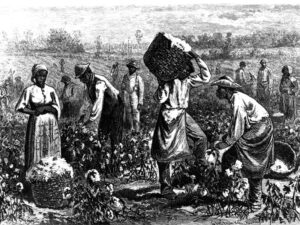
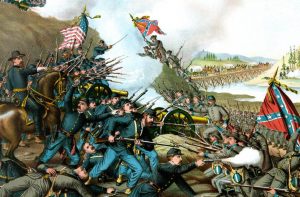 Most of us think that after the Civil War, the South simply accepted defeat and went on to become model citizens of the new America…the one without slavery. That was not the case, however. First of all, there were a number of plantation owners in the South, who just didn’t tell their slaves that they were free now. Finally, after being forced to do so, the announcement came, a whole two months after the effective conclusion of the Civil War, and even longer since Abraham Lincoln had first signed the Emancipation Proclamation. Nevertheless, even after that day, many enslaved black people in Texas still weren’t free. That part was bad enough, but that wasn’t all there was to it.
Most of us think that after the Civil War, the South simply accepted defeat and went on to become model citizens of the new America…the one without slavery. That was not the case, however. First of all, there were a number of plantation owners in the South, who just didn’t tell their slaves that they were free now. Finally, after being forced to do so, the announcement came, a whole two months after the effective conclusion of the Civil War, and even longer since Abraham Lincoln had first signed the Emancipation Proclamation. Nevertheless, even after that day, many enslaved black people in Texas still weren’t free. That part was bad enough, but that wasn’t all there was to it.
We have heard people say that if this or that president gets into office, they are leaving the country. People have also left the country because they didn’t want to fight is a war. However, I had never heard that 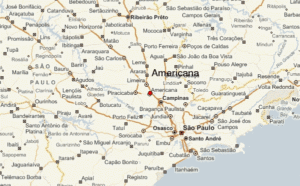 approximately 20,000 Confederates decided to actually leave the country. They went to Brazil after the Civil War to create a kingdom built on slavery. These people were so set on their lifestyle that they were willing to pull up stakes and start over in order to keep their slaves and their slavery lifestyle. The reality was that after four bloody years of war, the Confederacy virtually crumbled in April 1865. Nevertheless, a rather large group of the Confederates were not ready to accept defeat.
approximately 20,000 Confederates decided to actually leave the country. They went to Brazil after the Civil War to create a kingdom built on slavery. These people were so set on their lifestyle that they were willing to pull up stakes and start over in order to keep their slaves and their slavery lifestyle. The reality was that after four bloody years of war, the Confederacy virtually crumbled in April 1865. Nevertheless, a rather large group of the Confederates were not ready to accept defeat.
Instead, as many as 20,000 of them fled south. They relocated to Brazil, where a slaveholding culture already existed. There, they hoped the country’s culture could help them preserve their traditions. Once there, they cooked Southern food, spoke English, and tried to buy enough slaves to resurrect the pre-Civil War plantation system. These people, known as Confederados, were enticed to Brazil by offers of cheap land from Emperor Dom Pedro II, who had hoped to gain expertise in cotton farming. Initially, most of these so-called Confederados settled in the current state of São Paulo, where they founded the city of Americana, which was once part of the neighboring city of Santa Bárbara d’Oeste. The descendants of other Confederados would later be found throughout Brazil. They were very happy with their decision to leave the United States, and very 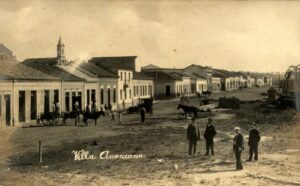
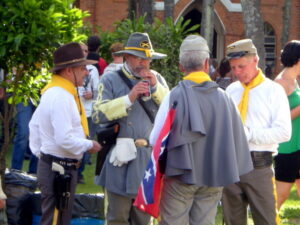 happy that they could continue to keep slaves. Nevertheless, their “victory” was not without loss too. They had to give up their citizenship in the United States, and I have to wonder if their lives have turned out as they hoped they would, or if they are living in much poorer conditions in Brazil. Nevertheless, they stayed, and to this day, the so-called Confederados gather each year to fly the Confederate flag and celebrate their lost heritage.
happy that they could continue to keep slaves. Nevertheless, their “victory” was not without loss too. They had to give up their citizenship in the United States, and I have to wonder if their lives have turned out as they hoped they would, or if they are living in much poorer conditions in Brazil. Nevertheless, they stayed, and to this day, the so-called Confederados gather each year to fly the Confederate flag and celebrate their lost heritage.
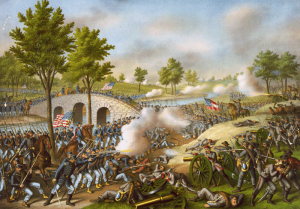 These days, with the many types of bombs nations use for warfare, it would be easy to annihilate an entire town, but during the Civil War…not so much. One bomb dropped on Hiroshima instantly killed 80,000 people. Of course that was on August 6, 1945, and not 1862. September 17, 1862 dawned slowly through the fog. It seemed like the start of a peacefully beautiful day, but looks can be deceiving. That morning, the soldiers were busy, trying to wipe away the dampness, when cannons began to roar and sheets of flame burst forth from hundreds of rifles. The bloodiest one-day battle in American History had begun. The Battle of Antietam was a 12-hour battle that swept across the rolling farm fields in western Maryland. It was this battle between North and South that changed the course of the Civil War, helped free over four million Americans, devastated Sharpsburg, and no other one-day battle would be as bloody.
These days, with the many types of bombs nations use for warfare, it would be easy to annihilate an entire town, but during the Civil War…not so much. One bomb dropped on Hiroshima instantly killed 80,000 people. Of course that was on August 6, 1945, and not 1862. September 17, 1862 dawned slowly through the fog. It seemed like the start of a peacefully beautiful day, but looks can be deceiving. That morning, the soldiers were busy, trying to wipe away the dampness, when cannons began to roar and sheets of flame burst forth from hundreds of rifles. The bloodiest one-day battle in American History had begun. The Battle of Antietam was a 12-hour battle that swept across the rolling farm fields in western Maryland. It was this battle between North and South that changed the course of the Civil War, helped free over four million Americans, devastated Sharpsburg, and no other one-day battle would be as bloody.
The Battle of Antietam marked the first invasion into the North by Confederate General Robert E Lee and the Army of Northern Virginia. It was the culmination of the Maryland Campaign of 1862. Southern armies were also advancing in Kentucky and Missouri, as the tide of war flowed north. After Lee’s dramatic victory at the Second Battle of Manassas during the last two days of August, he wrote to Confederate President Jefferson Davis that “we cannot afford to be idle.” Lee wanted to keep the pressure on in order to secure Southern independence through victory in the North; influence the Fall mid-term elections; obtain much-needed supplies; move the war out of Virginia, possibly into Pennsylvania; and to liberate Maryland, a Union state, but a slave-holding border state divided in its values.
Lee’s army splashed across the Potomac River and arrived in Frederick, Virginia, where he boldly divided his army to capture the Union garrison stationed at Harpers Ferry. A vital location on the Confederate lines of supply and communication back to Virginia; Harpers Ferry, Maryland was the gateway to the Shenandoah Valley. Lee’s link to the south was threatened by the 12,000 Union soldiers at Harpers Ferry. General Thomas Jonathan “Stonewall” Jackson and about half of the Army of Northern Virginia were sent to capture Harpers Ferry. The rest of the Confederates moved north and west toward South Mountain and Hagerstown, Maryland. The Confederate army soon retreated from South Mountain, and Lee considered returning to Virginia. However, with Jackson’s capture of Harpers Ferry on September 15th, Lee decided to make a stand at Sharpsburg.
Lee gathered his forces on the high ground west of Antietam Creek, with General James Longstreet’s command holding the center and the right, while Jackson’s men filled in on the left. The Confederate position was strengthened with the mobility provided by the Hagerstown Turnpike that ran north and south along Lee’s line. Still, the Potomac River behind them and only one crossing back to Virginia remained a risk. Lee and his men watched the Union army gather on the east side of Antietam Creek. Thousands of soldiers in blue marched into position throughout September 15th and 16th as General McClellan prepared for his attempt to drive Lee from Maryland. McClellan’s plan was to “attack the enemy’s left” and when “matters looked favorably,” attack the Confederate right, and “whenever either of those flank movements should be successful to advance our center.” As the opposing forces moved into position during the rainy night of September 16th, one Pennsylvanian remembered, “…all realized that there was ugly business and plenty of it just ahead.”
The twelve-hour battle began at dawn, and for the next seven hours, there were three major Union attacks on the Confederate left, moving from north to south. General Joseph Hooker’s command led the first Union assault. General Joseph Mansfield’s soldiers attacked second, followed by General Edwin Sumner’s men as McClellan’s plan broke down into a series of uncoordinated Union advances. The fierce battle raged across the Cornfield, East Woods, West Woods, and the Sunken Road as Lee shifted his men to withstand each of the Union thrusts. After clashing for over eight hours, Lee’s troops were pushed back, but not broken. Shockingly, over 15,000 soldiers were killed or wounded.
While the Union assaults were being made on the Sunken Road, a mile-and-a-half farther south, Union General Ambrose Burnside opened the attack on the Confederate right. He first sought to capture the bridge that would later bear his name, but a small Confederate force, positioned on higher ground, was able to delay Burnside for three hours. Finally, about 1:00pm Burnside captured the bridge, and then reorganized for two hours before moving forward across the difficult terrain…an unfortunate delay. When the advance did begin, it was turned back by Confederate General AP Hill’s reinforcements, who had arrived in the late afternoon from Harpers Ferry.
Neither flank of the Confederate army collapsed far enough for McClellan to advance his center attack, leaving a sizable Union force that never entered the battle. Despite an estimated 23,100 casualties of the nearly 100,000 engaged, both armies stubbornly held their ground as the sun set on the devastated landscape. The next day, September 18, 1862, the opposing armies gathered their wounded and buried their dead. That night 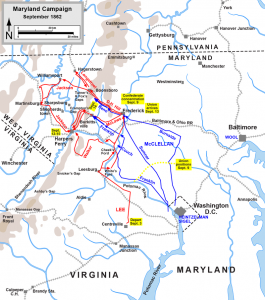 General Robert E Lee’s army withdrew back across the Potomac River to Virginia, ending his first invasion into the North. Lee’s retreat to Virginia provided President Abraham Lincoln the opportunity he had been waiting to issue the preliminary Emancipation Proclamation. Now, the Civil War had a dual purpose of preserving the Union and ending slavery, which the United States had been trying to end since it was founded.
General Robert E Lee’s army withdrew back across the Potomac River to Virginia, ending his first invasion into the North. Lee’s retreat to Virginia provided President Abraham Lincoln the opportunity he had been waiting to issue the preliminary Emancipation Proclamation. Now, the Civil War had a dual purpose of preserving the Union and ending slavery, which the United States had been trying to end since it was founded.
The Battle of Antietam was fought over an area of 12 square miles. Today the site consists of 184 acres containing approximately 5 miles of paved avenues. Located along the battlefield avenues to mark battle positions of infantry, artillery, and cavalry are many monuments, markers, and narrative tablets. Markers describe the actions at Turner’s Gap, Harpers Ferry, and Blackford’s Ford. Key artillery positions on the field of Antietam are marked by cannon. And 10 large-scale field exhibits at important points on the field indicate troop positions and battle action.
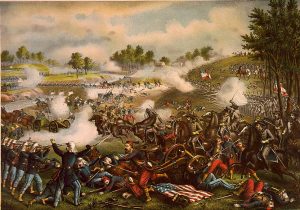 People don’t think of war as being something they want to send their children into…much less witness one themselves, or even one battle of a war. War really isn’t a spectator sport, after all. Nevertheless, there was a time, when people didn’t really seem to realize that. Early in the Civil War, the Union military command believed that the Confederate army could be easily defeated, and that the war would be over very quickly and with very little loss of life.
People don’t think of war as being something they want to send their children into…much less witness one themselves, or even one battle of a war. War really isn’t a spectator sport, after all. Nevertheless, there was a time, when people didn’t really seem to realize that. Early in the Civil War, the Union military command believed that the Confederate army could be easily defeated, and that the war would be over very quickly and with very little loss of life.
In July of 1861, the folly of that overconfidence was sharply pointed out when General Irvin McDowell led a premature offensive into northern Virginia. He set out in search of the Confederate forces, leading 34,000 mostly inexperienced troops, who were also poorly trained, toward the railroad junction of Manassas, which is just 30 miles from Washington DC. General Beauregard of the Confederate forces, was alerted of the advance, and so brought together 20,000 troops there. He was soon joined by General Joseph Johnston, who brought 9,000 additional men by way of railroad.
On the morning of July 21, 1861, the people of the area heard of the opposing forces, and that a battle was about to break out in their vicinity. Hundreds of civilian men, women, and children turned up to watch the first major battle of the Civil War. The fighting commenced with three Union divisions crossing the Bull Run stream. The Confederate flank was driven back to Henry House Hill. General Beauregard had set up a strong defensive line backed up by a brigade of Virginia infantry under General Thomas Jackson. From a concealed slope, Jackson’s men began firing a series of Federal charges. It was this plan that gave Jackson his famous nickname Stonewall. The Confederate cavalry under J.E.B. Stuart captured the Union artillery, and General Beauregard ordered a counterattack on the exposed Union right flank. The rebels came charging down the hill, yelling furiously, and General McDowell’s line was broken, forcing his troops in a hasty retreat across Bull Run. The retreat soon became an all out run for their lives, and supplies littered the road back to Washington. Union forces endured a loss of 3,000 men killed, wounded, or missing in action while the Confederates suffered 2,000 casualties in the bloody battle.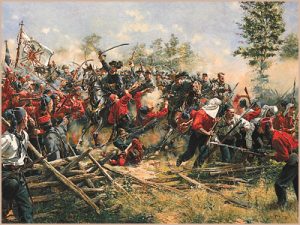
The horrific battle not only the frightened spectators at Bull Run, but the United States government in Washington as well, which was faced with an uncertain military strategy that would obviously need to change, if the South was to be stopped. I have a hard time understanding how the people could possibly have thought this was something to go out and watch…much less to take their children to. Of course, these days I think we have seen so much war on television, that no one in their right mind would go to watch a battle and no one would take their kids, because war is not a spectator sport.
 Americans are a people who have no problem speaking their minds. I suppose it all goes back to the reasons we left England in the first place. We were only allowed to believe certain things, and if we chose to be different, we could have been killed or imprisoned. It is what our nation was built on in more ways than just religion. The point was supposed to be that we were free to live our lives as we chose to, within a very few certain guidelines. For the most part, things went along smoothly…until November of 1860, when President Lincoln was elected to the presidency, that is. The people of the Deep South felt that their way of life was being threatened, in that they held slaves, and Lincoln was against slavery, as were the Northern states, or most of the people in the Northern states anyway. Of course, this whole issue brought our nation to war, a really sad thing when two sides of a nation war against each other.
Americans are a people who have no problem speaking their minds. I suppose it all goes back to the reasons we left England in the first place. We were only allowed to believe certain things, and if we chose to be different, we could have been killed or imprisoned. It is what our nation was built on in more ways than just religion. The point was supposed to be that we were free to live our lives as we chose to, within a very few certain guidelines. For the most part, things went along smoothly…until November of 1860, when President Lincoln was elected to the presidency, that is. The people of the Deep South felt that their way of life was being threatened, in that they held slaves, and Lincoln was against slavery, as were the Northern states, or most of the people in the Northern states anyway. Of course, this whole issue brought our nation to war, a really sad thing when two sides of a nation war against each other.
It is a difficult thing when so many people have such differing beliefs about the same issue. And sometimes it gets so ugly, that I have to wonder about the sanity of some people. When people burn or otherwise deface our flag, sometimes in horribly disgusting ways, or do the same to Bibles and other religious books, it is disrespectful. What I find especially disturbing is that these same people want respect for their cause or lifestyle, but they will not give the same respect for the cause or lifestyle of others. It really is a two way street. I know that a lot of people are calling for the removal of the Confederate Flag from…everywhere, but in reality it is a part of our history. We need to remember that because they lost the battle, it 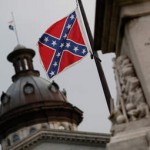 does not mean they were not brave in the fight. Lately, I have seen some shocking displays in this nation. Digging up the graves of a general and his wife, because he fought for the South, and taking shows off the air because they have a reference to a Confederate Flag in them. Political Correctness has tipped the balance of this nation to the point of insanity. It must stop, or we will have another war here. We have already had a threat of states wanting to secede from the union. It is a sad state for this great nation to be in.
does not mean they were not brave in the fight. Lately, I have seen some shocking displays in this nation. Digging up the graves of a general and his wife, because he fought for the South, and taking shows off the air because they have a reference to a Confederate Flag in them. Political Correctness has tipped the balance of this nation to the point of insanity. It must stop, or we will have another war here. We have already had a threat of states wanting to secede from the union. It is a sad state for this great nation to be in.
In the end of the Civil War, the South lost the war, the slaves were freed, and given their proper rights. No, it wasn’t the last of the battles over this issue, unfortunately, but the healing of this nation began. The eleven states that had seceded from the Union…Alabama, Florida, Georgia, Louisiana, Mississippi, South Carolina, Texas, Arkansas, North Carolina, Tennessee and Virginia, were returning one by one. Change was coming and it would slowly come to be accepted. I suppose that, as in the Civil War, the people who are fighting for their rights these days, consider the battles well worth the outcome, and maybe they are, but in many ways, we have forgotten that the people of the other side of the issue have rights too. The country was largely founded on a live and let live way of life…whether you agree with them or not. This may not be the perfect way for our nation to be, but it is as close as we can get. As with the eleven states who returned to the Union, I think it is important to consider the feeling of those who have lost the battle you felt the need to win, because in most cases, they are good people too. On this historic day, as our nation became united again, Georgia became the 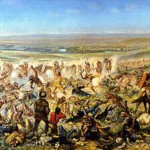 last state to be readmitted to the Union. They returned, because whether they agreed with every thing this nation stood for or not, they still knew that this was a great nation, and one they wanted to be a part of. I believe that was the case of the Cowboys and Indians. We all know that the Indians lost to the cowboys, but that does not make them any less a proud people, nor does it make them any less brave. They deserve respect, as do all the people who have lost the battles that have gone on in this nation about political correctness, policy change, or the battle of the North and South. In the words of Abraham Lincoln, “A house divided against itself cannot stand.” Whether we agree with things or disagree, we must stand united…lest we forget that the rights we take from another today, could be taken from us tomorrow.
last state to be readmitted to the Union. They returned, because whether they agreed with every thing this nation stood for or not, they still knew that this was a great nation, and one they wanted to be a part of. I believe that was the case of the Cowboys and Indians. We all know that the Indians lost to the cowboys, but that does not make them any less a proud people, nor does it make them any less brave. They deserve respect, as do all the people who have lost the battles that have gone on in this nation about political correctness, policy change, or the battle of the North and South. In the words of Abraham Lincoln, “A house divided against itself cannot stand.” Whether we agree with things or disagree, we must stand united…lest we forget that the rights we take from another today, could be taken from us tomorrow.
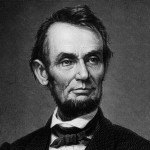 On June 16, 1858 more than 1,000 delegates met in the Springfield, Illinois, statehouse for the Republican State Convention. They chose Abraham Lincoln as their candidate for the U.S. Senate, running against Democrat Stephen A. Douglas. At 8:00 pm Lincoln delivered his famous House Divided speech to his Republican colleagues in the Hall of Representatives. Lincoln said, “A house divided against itself cannot stand. I believe this government cannot endure, permanently, half slave and half free. I do not expect the Union to be dissolved — I do not expect the house to fall — but I do expect it will cease to be divided. It will become all one thing or all the other. Either the opponents of slavery will arrest the further spread of it, and place it where the public mind shall rest in the belief that it is in the course of ultimate extinction; or its advocates will push it forward, till it shall become lawful in all the States, old as well as new — North as well as South.” Abraham Lincoln decided to run for president, and was elected president on November 6, 1860, and on December 20, 1860 it began…South Carolina seceded from the Union, followed within two months by Mississippi, Florida, Alabama, Georgia, Louisiana, and Texas. On February 9, 1861 the Confederate States of America was formed with Jefferson Davis as it’s president. Abraham Lincoln was sworn in as the 16th President of the United States of America on March 4, 1861. On April 12, 1861 the Confederates under General Pierre Beauregard attacked Fort Sumter in Charleston, South Carolina…the Civil War had begun.
On June 16, 1858 more than 1,000 delegates met in the Springfield, Illinois, statehouse for the Republican State Convention. They chose Abraham Lincoln as their candidate for the U.S. Senate, running against Democrat Stephen A. Douglas. At 8:00 pm Lincoln delivered his famous House Divided speech to his Republican colleagues in the Hall of Representatives. Lincoln said, “A house divided against itself cannot stand. I believe this government cannot endure, permanently, half slave and half free. I do not expect the Union to be dissolved — I do not expect the house to fall — but I do expect it will cease to be divided. It will become all one thing or all the other. Either the opponents of slavery will arrest the further spread of it, and place it where the public mind shall rest in the belief that it is in the course of ultimate extinction; or its advocates will push it forward, till it shall become lawful in all the States, old as well as new — North as well as South.” Abraham Lincoln decided to run for president, and was elected president on November 6, 1860, and on December 20, 1860 it began…South Carolina seceded from the Union, followed within two months by Mississippi, Florida, Alabama, Georgia, Louisiana, and Texas. On February 9, 1861 the Confederate States of America was formed with Jefferson Davis as it’s president. Abraham Lincoln was sworn in as the 16th President of the United States of America on March 4, 1861. On April 12, 1861 the Confederates under General Pierre Beauregard attacked Fort Sumter in Charleston, South Carolina…the Civil War had begun.
The war was long and bloody. Families were torn apart, as brothers fought against brothers and fathers against sons. The South wanted slavery, and the North did not. This war would be a horrible, brutal war. Losing was not an option for the North. Slavery had to be abolished…it was inhumane, and wrong in every sense of the word. This was Lincoln’s signature change to this nation, and those who didn’t want it hated him for it. The battles raged for four long years, ending the lives of 618,222 Americans and eventually sending 50,000 survivors home as amputees. The Civil War would go down in history as the deadliest of all United States wars…and the enemy wasn’t a terrorist group or some other country…it was us. I think it is a sad thing to think that we were our own worst enemy at one time in history.
The battles of the Civil War are names many people remember from their history lessons, Chickamauga, Chattanooga, Cold Harbor, Chancellorsville, Fredericksburg, Bull Run, and a second Bull Run, Shiloh, Antietam..which was the bloodiest day in US Military history with 26,000 men killed, and of course the famous Battle of Gettysburg on July 1-3, 1863, which was the battle that turned the tide in favor of the Union. On November 19, 1863, President Lincoln gave his famous Gettysburg address dedicating the Soldiers’ National Cemetery. The war continued for another year and a half, before General Robert E Lee, being completely surrounded by Union forces, with no possibility of escape, surrendered to General Ulysses S Grant at Appomattox, Virginia. They agreed to a meeting in the parlor of the Wilmer McLean home. The meeting took place at one o’clock in the afternoon, and on this day, April 9, 1865 General Robert E Lee surrendered.
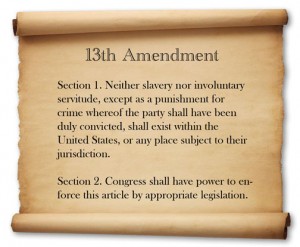 The Union had all but won, but this was not over yet. On April 14, 1865, the Stars and Stripes was raised over Fort Sumter…where the war began. That night President Lincoln and his wife, Mary, went to see the play “Our American Cousin” at the Ford Theater. At 10:13pm, during the third act of the play, Confederate sympathizer John Wilkes Booth shot the president in the head. He was moved to the house across the street where doctors tried in vain to save his life. President Lincoln died at 7:22am on April 15, 1865. The war dwindled to a close, and in May the final soldiers surrendered. The Union was restored, and the Thirteenth Amendment to the United States Constitution was passed by Congress on January 31, 1865, and was finally ratified on December 6, 1865.
The Union had all but won, but this was not over yet. On April 14, 1865, the Stars and Stripes was raised over Fort Sumter…where the war began. That night President Lincoln and his wife, Mary, went to see the play “Our American Cousin” at the Ford Theater. At 10:13pm, during the third act of the play, Confederate sympathizer John Wilkes Booth shot the president in the head. He was moved to the house across the street where doctors tried in vain to save his life. President Lincoln died at 7:22am on April 15, 1865. The war dwindled to a close, and in May the final soldiers surrendered. The Union was restored, and the Thirteenth Amendment to the United States Constitution was passed by Congress on January 31, 1865, and was finally ratified on December 6, 1865.
 Probably my favorite historical President, would have to be Abraham Lincoln. Even in elementary school, I found his political acts to be most interesting. Of course, my favorite speech would have to be the Gettysburg Address. Every time I hear that speech, I get Goosebumps. I’m sure I’m not alone in that either. That was such a moving speech. It was at a time when our nation was severely divided, and on the brink of splitting in two. No one could agree on what we should be like. And yet, I believe that Lincoln made the right call. Owning slaves was wrong, and if it took a war to free them, then that was the way it would have to be. I am also glad that our nation did not divide, as I think we are a great nation because of our strongly united stance.
Probably my favorite historical President, would have to be Abraham Lincoln. Even in elementary school, I found his political acts to be most interesting. Of course, my favorite speech would have to be the Gettysburg Address. Every time I hear that speech, I get Goosebumps. I’m sure I’m not alone in that either. That was such a moving speech. It was at a time when our nation was severely divided, and on the brink of splitting in two. No one could agree on what we should be like. And yet, I believe that Lincoln made the right call. Owning slaves was wrong, and if it took a war to free them, then that was the way it would have to be. I am also glad that our nation did not divide, as I think we are a great nation because of our strongly united stance.
Apparently, our nation agrees with me on just how great Abraham Lincoln was too, because on this day…his birthday…in 1914, the first stones were laid for the Lincoln Memorial. I doubt that the connection was lost to those who 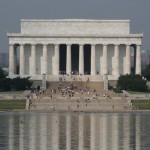 were doing the work on the splendid memorial, and maybe the work had officially been planned for that day for that very reason. Lincoln was known as the “Saviour of the Union” because of his actions to keep our nation together. The inscription reads, “In this temple, as in the hearts of the people for whom he saved the Union, the memory of Abraham Lincoln is enshrined forever.” And beneath these words, the 16th President of the United States sits immortalized in marble as an enduring symbol of unity, strength, and wisdom. I have to wonder if Lincoln would have been embarrassed or humbled by such a display. I’m sure he would be humbled, but I also think that because Lincoln was such a humble man, he would have also been a bit embarrassed.
were doing the work on the splendid memorial, and maybe the work had officially been planned for that day for that very reason. Lincoln was known as the “Saviour of the Union” because of his actions to keep our nation together. The inscription reads, “In this temple, as in the hearts of the people for whom he saved the Union, the memory of Abraham Lincoln is enshrined forever.” And beneath these words, the 16th President of the United States sits immortalized in marble as an enduring symbol of unity, strength, and wisdom. I have to wonder if Lincoln would have been embarrassed or humbled by such a display. I’m sure he would be humbled, but I also think that because Lincoln was such a humble man, he would have also been a bit embarrassed.
Abraham Lincoln came from humble beginnings. He was raised in what was then the western frontier in Kentucky and Indiana. He was mostly self educated, and became a lawyer in Illinois. He was a member of the 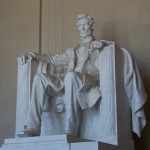 Whig Party, which is now gone, and then became a member of the Republican Party in 1854. He hated slavery and spoke out against it many times. He didn’t have much support in the South, of course, but he swept the Northern states and became president in 1860. He also reached out to the War Democrats, those who supported the war. He also confronted the Republicans who wanted to punish the South after the war, and called for more compromise with the anti-war Democrats who hated him…trying to bring peace within the government even before the war ended. Nevertheless, just six days after Robert E Lee surrendered, President Abraham Lincoln was assassinated by John Wilkes Booth, who was a Confederate sympathizer. Today, we remember Abraham Lincoln on the 206th anniversary of his birth.
Whig Party, which is now gone, and then became a member of the Republican Party in 1854. He hated slavery and spoke out against it many times. He didn’t have much support in the South, of course, but he swept the Northern states and became president in 1860. He also reached out to the War Democrats, those who supported the war. He also confronted the Republicans who wanted to punish the South after the war, and called for more compromise with the anti-war Democrats who hated him…trying to bring peace within the government even before the war ended. Nevertheless, just six days after Robert E Lee surrendered, President Abraham Lincoln was assassinated by John Wilkes Booth, who was a Confederate sympathizer. Today, we remember Abraham Lincoln on the 206th anniversary of his birth.
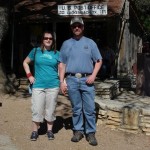 Kelli is my nephew’s wife, and has been a part of our family for almost 10 years now. She has always liked the idea of living in the country and raising donkeys, but lately she is focusing her interests on country music and traveling to concerts. Kelli has a blog, called Thoughts From A Gypsy Soul, and she writes about her travels, and her latest favorite songs. Check it out if you get a chance.
Kelli is my nephew’s wife, and has been a part of our family for almost 10 years now. She has always liked the idea of living in the country and raising donkeys, but lately she is focusing her interests on country music and traveling to concerts. Kelli has a blog, called Thoughts From A Gypsy Soul, and she writes about her travels, and her latest favorite songs. Check it out if you get a chance.
I think Kelli is right when she calls herself a Gypsy Soul, because she really wants to live somewhere in the South, probably Texas. Some people just don’t like the cold weather of the north, and Kelli is one of those people. I don’t know if her dreams will ever be realized, because, somehow we seem to end up where we are supposed to in life, I think, but time will tell how this turns out for Kelli.
Kelli is a kind soul too. During my sister-in-law, Brenda’s recent hospitalization, that lasted about a month, Kelli was a regular visitor. Her smiling face brightened Brenda’s days, and mine too. Whenever we were there together, we shared many laughs, and it was a lot of fun. Kelli has a great laugh…it’s fun to be around her when she is laughing a lot.
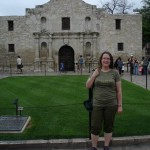
Kelli has a fascination with celebrities, and the royal family in particular. She would love to be related to them, and recently with the connection I made to the Schulenberg family to the Spencer family, she can now say that she is a cousin of Princess Diana and the rest of the current royal family, so that dream has finally been realized. I am still looking for a connection from her own side of the family, but haven’t found one as yet. Maybe, I will soon. Kelli hails from Reading, Michigan, and my family came from the Great Lakes area too, so you just never know. Today is Kelli’s birthday. Happy birthday Kelli!! Have a wonderful day!! We love you!!
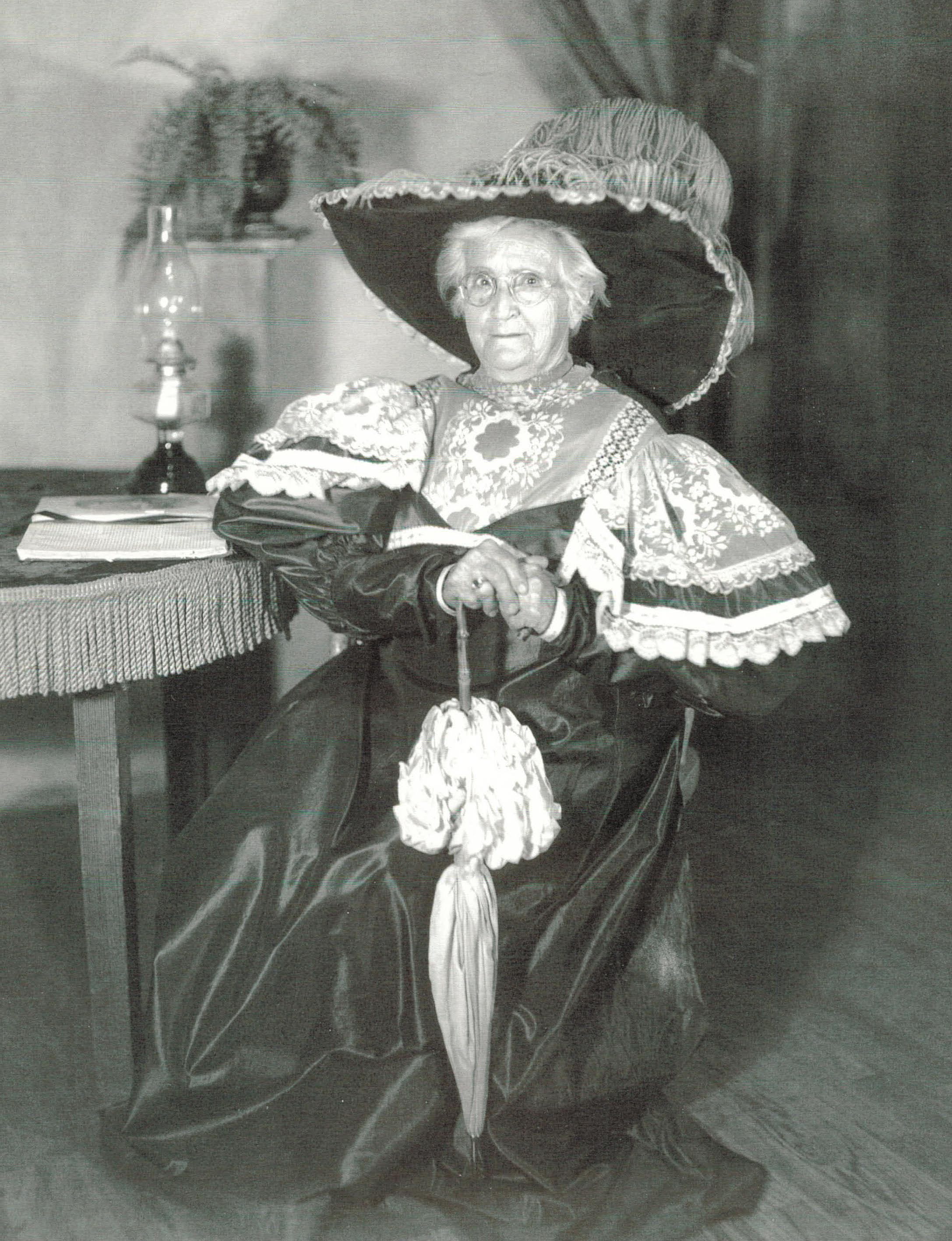 My grandmother was not a Southern Belle, but I think maybe she could have been. She was a beautiful woman, with a flair that few people possess. I have seen pictures of her and her sisters, or just her, dressed up as a Southern Belle, and I think she might have made a very fine Southern Belle. It’s funny to think that someone could have been maybe living in the wrong time, or that maybe some people could have lived in more than one time. Of course, her life wasn’t too far beyond those times, but it was far enough. And of course, there was also the fact that she didn’t live in the South.
My grandmother was not a Southern Belle, but I think maybe she could have been. She was a beautiful woman, with a flair that few people possess. I have seen pictures of her and her sisters, or just her, dressed up as a Southern Belle, and I think she might have made a very fine Southern Belle. It’s funny to think that someone could have been maybe living in the wrong time, or that maybe some people could have lived in more than one time. Of course, her life wasn’t too far beyond those times, but it was far enough. And of course, there was also the fact that she didn’t live in the South.
I have often wondered what it would have been like to live in the pre-civil war days. The beautiful gowns, and the lazy days. Of course, I don’t think I would have liked the whole idea of slavery, but if I could have done the lazy days and beautiful gowns without that, I think I might have liked it. In dreams, you can do that whole setting aside the bad parts and still having the good parts, so in my own imagination, I am able to sit on the veranda with a glass of lemonade, a plate of cookies, and wearing a beautiful gown, not having any responsibilities, just parties and visits with friends. But, in reality, I probably would have become very bored with that in no time.
My grandmother was an amazing woman, who raised 9 children, and never drove a car. She stayed at home with the kids, and cooked and cleaned, and raised those 9 children to be responsible, respectable citizens. First, I can’t imagine never driving a car, much less raising 9 kids without driving. I don’t know how she managed that, but that does seem to be a little similar to the Southern Belle type of woman…one who was taken care of, and yet 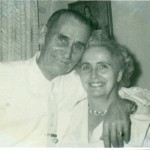 in reality, was the strong, capable mistress of the home…sort of like Scarlett O’Hara’s mother was…beauty with strength mixed in. Yes, I think that describes my grandmother quite well.
in reality, was the strong, capable mistress of the home…sort of like Scarlett O’Hara’s mother was…beauty with strength mixed in. Yes, I think that describes my grandmother quite well.
No, she wasn’t a Southern Bell, and didn’t live in that era, but she was a beautiful woman, who has grace and strength. She ran her home with authority, and sometimes, with the palm of her hand, and yet she made Grandpa feel like he was king of the castle. They were quite a pair, and while they weren’t rich southern landowners, they were so much richer in so many other ways, that I don’t think they felt like they missed out on one thing.

